
Back on Monday, March 4th. Resting this weekend. See you all then. Be well.

Back on Monday, March 4th. Resting this weekend. See you all then. Be well.
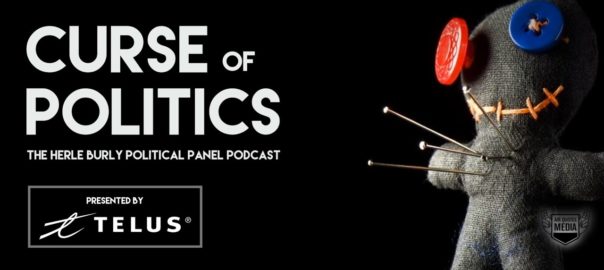
Watch The Curse of Politics panel on the inevitability of a Pierre Poilievre government come 2025.
Canadians are 18½ months away from the next federal election, in October 2025.
If the polls are to be believed, Conservative Party leader Pierre Poilievre — easily the most far-right leader ever of Canada’s Conservative Party — will sweep to power, to dominate federal governance from November 2025 thru October 2029.

If the 338 projection above is to be believed, Pierre Poilievre will secure somewhere in the neighbourhood of 210 seats in Parliament — for a gain of 91 seats, and a massive majority — while Justin Trudeau’s Liberals will be reduced to a rump caucus of approximately 62 Members of Parliament, with 93 MPs losing their seats.
Although the Curse of Politics panel — consisting of 45-year federal and provincial Liberal political veteran, the always avuncular and engagingly profane, David Herle, with Kory Teneycke representing the forces of evil (oh, we mean, the federal Conservative Party, where he played a central role in the Conservative Party government of Stephen Harper), and longtime New Democratic Party stalwart, Jordan Leichnitz, who as you’ll see and hear when you take in this must-watch / listen to podcast — will leave you convinced Justin Trudeau’s Liberals don’t have a hope in hell of retaining government past 2025.
There are those who might disagree.
https://twitter.com/VoiceOfFranky/status/1763041456959148193
Frank Graves is the founder of one of Canada’s most respected polling companies, EKOS Research, covering every federal campaign since 1980. When Mr. Graves suggests Pierre Poilievre doesn’t have a win in the bag, he’s a man to be listened to.

Of course, only Pierre Poilievre can fix a broken Canada. Or can he?
This is Pierre Poillievre's and @CPC_HQ election platform.
It’s as simple as this.1. Everything in the world is broken – Everyone is stupid.
2. I’m the smartest guy in the world. There will never be another!
3. Everything is the other guys fault. @JustinTrudeau
4. I have…— Rod Wuetherick (@RedIron777) October 18, 2023
You’ll want to take the time to read the 68 comment replies on the post above.
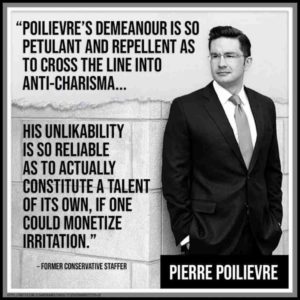
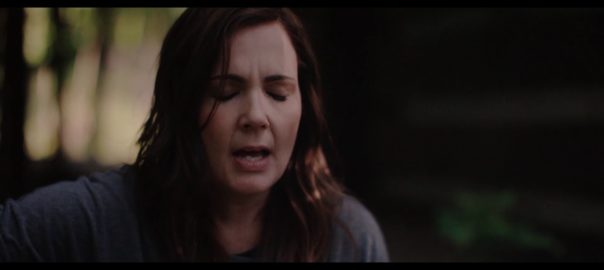
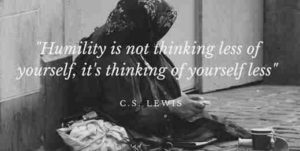
In the era of Donald Trump and Pierre Poilievre, humility has become so out of fashion as to almost have been forgotten. Nonetheless, it is worth articulating why humility is an essential attribute of civic life.
Genuine humility and good governance is defined by grace and an intense interest in the lives of others. The perspective of the public, our neighbours, must always be taken into account in the taking of decisions in the public realm.
In the fabric of democracy, humility will always stand as a cornerstone that fortifies the integrity and efficacy of electoral processes and the governance that ensues.
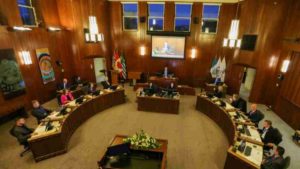
At the municipal level, where governance directly touches the lives of citizens in their communities, the significance of humility becomes even more pronounced.
Humility plays a critical role in the electoral process and among elected officials at the civic level, in fostering trust, co-operation, and effective leadership.
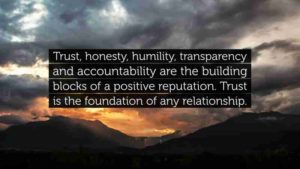
If we in Vancouver have suffered in the civic domain for most of the past quarter century, bereft of an otherwise recommendable civic administration of conscience, the central failure of governance in our city has occurred as a consequence of an unremitting arrogance, and a certitude that what is being done is right and in the collective interest, whether or not community consensus has been achieved.
Humility in the electoral process serves as a linchpin in maintaining the democratic ideals of fairness and equality.
Municipal elections are the bedrock of local democracy, where individuals come together to choose representatives who will voice their concerns, make decisions, and shape policies that directly impact our day-to-day lives.
Humble candidates prioritize the needs and aspirations of their constituents over personal ambitions, engaging in genuine dialogue and actively listening to the diverse voices within their communities. They eschew grandstanding and instead focus on authentic connections and constructive discourse, thereby fostering an electoral environment that is characterized by respect, civility, and inclusivity.
Once elected, those persons who are elected to City Council, Park Board or School Board bear the weighty responsibility of representing the interests of their constituents, while navigating the complexities of policy making and administration.
In this capacity, humility serves as a guiding principle that grounds officials in a recognition of their fallibility and the limitations of their knowledge.
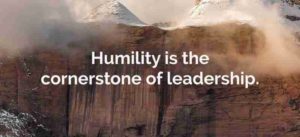
Humble leaders understand that they do not possess all the answers and thus remain open to diverse perspectives, expertise, and feedback from both constituents and fellow stakeholders.
By embracing humility, elected officials cultivate an environment of collaboration and collective problem-solving, transcending partisan divides and fostering innovative solutions to the myriad challenges facing their communities.
Furthermore, humility engenders trust and credibility among constituents, essential elements for the legitimacy of municipal governance.
In an era marked by heightened skepticism towards traditional institutions, humility offers a powerful antidote to the erosion of public trust in government.
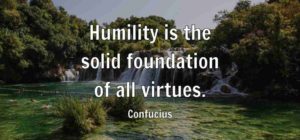
Humble leaders prioritize the common good over personal gain, earning the respect and admiration of their constituents through their humility, authenticity, and commitment to serving the public interest.
The challenges confronting municipalities require leaders who possess the humility to acknowledge the complexity of these issues and the willingness to collaborate with diverse stakeholders to address them effectively.
Fostering trust and cooperation to promoting effective leadership and governance, humility serves as a guiding principle enriching the fabric of local democracy.
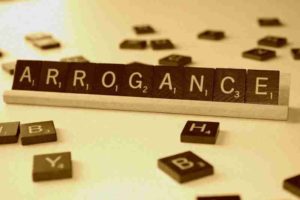
Let us be very clear here: we as a voting public in Vancouver do not want more arrogance in civic governance of our city.
We do not want holier-than-thou elected civic officials, whether they are with the so-called “progressive coalition” or the nominally right-of-centre ABC Vancouver civic party dictating what is best for us, and ignoring our voices. We’ve had a quarter century of that, and that is more than enough.
In Vancouver, to be a respected, successful and admired politician, one must know what one stands for and what one is fighting for, to know how to work with others, to listen to the public and be a voice for change for the better.
If you’re an elected official, you better darn well listen to the public, bring them along with you, and not find yourself sitting back on your high horse telling the public …
“Oh, deary, I know what’s best for you. Oh sure, I know you think you know what’s best for you, but believe me, I know better than you what’s good for you. Just trust me. And even if you don’t trust me, I’m going to go ahead and do what I damn well please, anyway.”
That’s a recipe for electoral disaster, and a very pissed off public — and if you’ve got any caring, compassion and humility at all, you don’t want that.
Take heed elected officials. Should you fail to do so, you proceed at your peril.
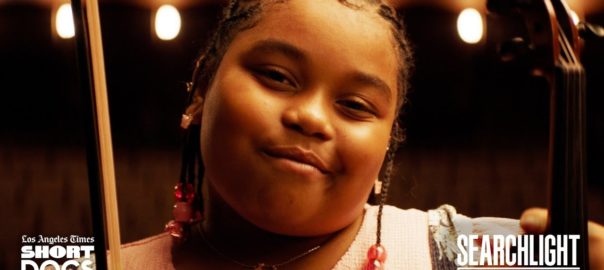
Porché Brinker plays violin in The Last Repair Shop, which tells the story of technicians who repair public school musical instruments in Los Angeles free of charge, and the kids who play them.
Only one documentary short nominee this year has the full balance of human interest, social relevance and aesthetic appeal that tends to make a winner.
It’s the Oscar-nominated The Last Repair Shop, directed by Halifax filmmaker Ben Proudfoot, who won two years ago for The Queen of Basketball, a New York Times Opinion production, and the composer Kris Bowers, who was nominated with Proudfoot for A Concerto Is a Conversation, another Times Opinion documentary.
This time, both have made their documentary with The Los Angeles Times.
“In a warehouse in the heart of Los Angeles, a dwindling handful of devoted craftspeople maintain more than 80,000 student musical instruments, the largest remaining workshop in America of its kind. In the film, you’ll meet four unforgettable characters whose broken-and-repaired lives have been dedicated to bringing so much more than music to schoolchildren in Los Angeles.”
The Last Repair Shop is a great film, a moving, elegiac and engaging must-watch if you’re a family, a teacher or are dedicated to public education.
The entirety of the film is available on YouTube, or on Disney+. If you have a Smart TV, you’ll absolutely want to watch the film on the bigger screen.
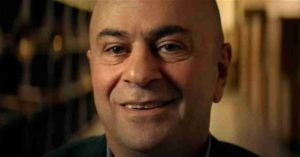
Steve Bagmanyan is the supervisor of the L.A. Unified School District’s Musical Instrument Repair Shop
In The Last Repair Shop, the repair shop of the title fixes instruments for the city’s school district, the film relating the story of the L.A. Unified School District’s Musical Instrument Repair Shop — the last public school district in the U.S. to service musical instruments free of charge — where 11 technicians service about 6,000 instruments each year for more than 1,300 schools across the city.
Steve Bagmanyan, supervisor of the repair shop: “Music can do wonderful things. Music can change lives. Music can take you off the streets. Music can fill you up with joy, with happiness.”
The opening text says the service has been offered to students for decades.
The Last Repair Shop presents the recollections of four specialists (in strings, brass, woodwinds and piano), who share their experiences of immigration, of coming to terms with being gay and even of opening for Elvis in a bluegrass band, a long-term payoff of buying a $20 fiddle at a swap meet.
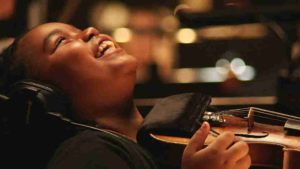
Porché Brinker in Ben Proudfoot’s Oscar-nominated documentary short film, The Last Repair Shop.
Schoolchildren further testify to how music affects their lives. The contrast gives The Last Repair Shop a gentle inter-generational poignance, as it makes an uninflected case for the importance of financing public school music education.
It’s not just the students whose lives have been changed by music.
The people who repair the instruments all have their own stories to tell — whether it’s about travelling the country with a $20 fiddle from a flea market, leaving home to chase the American dream, growing up gay in the ’70s, or even surviving ethnic cleansing.
And at the centre of each story is music, and a desire to repair — and to heal.
“We all have broken relationships, broken promises. The world is, in many ways, broken. And I think what these people stand for is an optimism that sometimes you can make things whole again with enough effort and care and patience,” Ben Proudfoot says.
“You can’t fix everything that’s broken. But sometimes you can. And for that one time out of 10 where you can, it’s worth doing. And I think there’s not too many lessons better than that.”

The Last Repair Shop is a love letter to the role of music in public education, a testament to seeing how broken something may be — and fixing it anyway.
And it’s a tribute to those who toil away, largely without recognition, in service of the important task of helping the next generation realize their dreams.